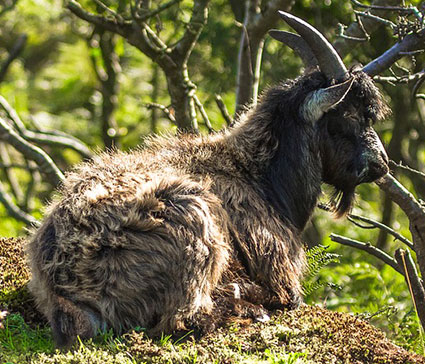A very brief history of Coffee: From goats to the globe

As one of the most-traded and most consumed commodities in the world – and only second to petroleum – coffee is an integral part of our modern society.
But what about the past of this most moreish of caffeine boosts? How did we reach this stage? How did coffee become the behemoth of a beverage it is today?
It all started with goats
 Yes, coffee began with farmers in Ethiopia discovering how goats they herded were almost instantly invigorated after eating fallen coffee cherries.
Yes, coffee began with farmers in Ethiopia discovering how goats they herded were almost instantly invigorated after eating fallen coffee cherries.
Kaldi, a ninth-century goat herder was the reported to have discovered this effect, after consulting the local monastery about this. The abbot had the smart idea to dry and boil the berries to make a hot beverage, Kaldi was eager to try and mistakenly threw the berries into a fire, where the unmistakable aroma of roasted coffee drifted through the night air.
The roasted beans were raked from the ember of the fires, ground up and dissolved in hot water: Kaldi had created the world’s first ever cup of coffee.
Monks at the monastery found that this new drink could keep them awake for hours at a time – just what they needed for the hours per day they devoted specifically to prayer. As word spread, so did the hot drink.
Others had claimed to have discovered coffee, with Ghothul Akbar Nooruddin Abu al-Hasan al-Shadhili claiming that he spotted berry-eating birds flying energetically over this village. After tasting the berries he too found himself to be oddly-energetic.
These are not the only claims to the coffee finding crown…
The Sheik origin story
An alternative story claims that coffee was first discovered by an Arab sheik named Omar, who whilst in exile from Mocha (Arabia Felix in modern-day Yemen), found the berries after chewing through them to stave off hunger.
Finding them much too bitter, Omar tried roasting them, which only made them hard; finally experimenting by boiling them into a liquid form.
After drinking the rich brown liquid he found that he could – apparently – stay awake for days on end. Able to pray and perform miracles from his cave in the desert near Ousab, due to the unnatural energy boost provided by the caffeine within coffee – which was yet to be discovered as the reason for coffee’s energy boosting properties.
This ‘miracle discovery’ allowed him to return home to Mocha, become a saint, whilst coffee became part of the Arab world.
Coffee finds roots
Whatever the origin, coffee had clearly found root throughout Persia, Egypt, Syria and Turkey by the 16th century. Becoming the drink of choice in those nations, and gaining reputation as the ‘wine of Araby’.
Thousands of pilgrims visiting the holy city of Mecca each year would see coffee increase in popularity throughout the centuries.
Merchants from Yemen would take the coffee plant home from Ethiopia to grow it for themselves.
As coffee became more widely available, it spread quickly across the African and Asian continent before finding it’s way into the Balkans, Italy and the rest of Europe.
The devil’s cup
 Coffee had been decreed ‘haraam’ in Mecca during 1511, with scholars and jurists being banned from consuming the drink.
Coffee had been decreed ‘haraam’ in Mecca during 1511, with scholars and jurists being banned from consuming the drink.
Meccan governor Khair Beg was afraid that coffee would create opposition to his rule, with men gathering to consume coffee and discuss various religious and political issues of the day.
With coffee making the short trip from Africa and the Middle East, to Europe’s mainland, there were bound to be many issues. After first landing in Venice – a lucrative trade city during the middle of the 15-16th century – it was met with suspicion and religious prejudice.
Catholics were quick to condemn coffee, suspiciously like a substitute for wine used in the Eucharist; it was therefore outlawed.
Pope Clement VIII tasted coffee, and delcared: “This devil’s drink is so delicious…we should cheat the devil by baptising it!”
And so coffee was dubbed the devil’s drink, or the devil’s cup.
England welcomes coffee open-armed
The first coffee house in England was established in Oxford in 1650.
The Angel in the parish of St Peter in the east, by a Jewish gentleman named Jacob, which is now home to The Grand Cafe.
London’s first ever coffee house opened in 1652 in St Michael’s Alley. A Greek man named Pasqua Rosée, who had also set up a coffee stall in Paris, was the man who brought coffee to London.
By 1675 there were a reported 3,000 coffee houses in England alone. Many even included bed and breakfast facilities, to accommodate the increasing popularity of the drink.
Most had exotic names such as Turk’s Head coffee house, The Jerusalem Coffee-house and variations on the Middle Eastern origins of the format.
Information from this post was taken from Coffee: A Drink for the Devil, published by Amberley Publishing, 2016.
